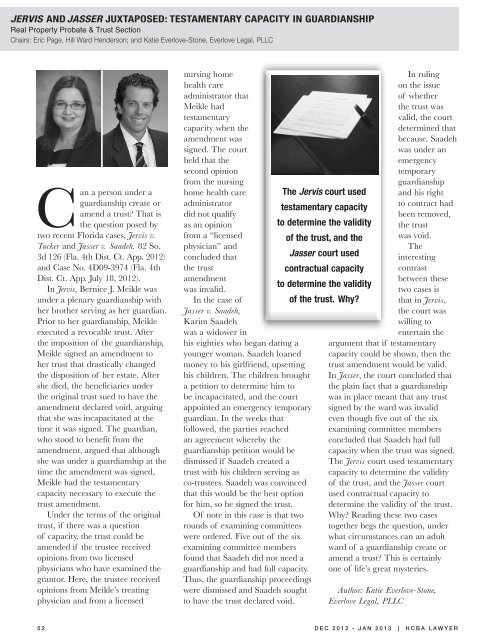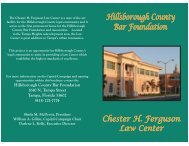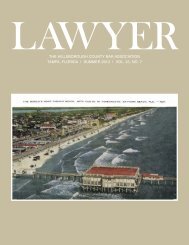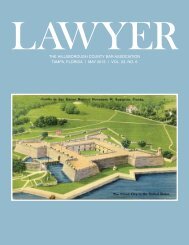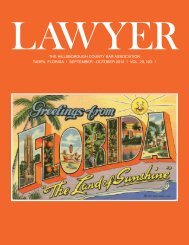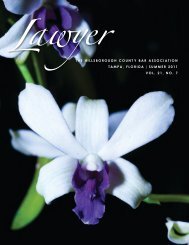december 2012 - Hillsborough County Bar Association
december 2012 - Hillsborough County Bar Association
december 2012 - Hillsborough County Bar Association
Create successful ePaper yourself
Turn your PDF publications into a flip-book with our unique Google optimized e-Paper software.
JERVIS ANDJASSER JUXTAPOSED: TESTAMENTARY CAPACITY IN GUARDIANSHIP<br />
Real Property Probate & Trust Section<br />
Chairs: Eric Page, Hill Ward Henderson; and Katie Everlove-Stone, Everlove Legal, PLLC<br />
Can a person under a<br />
guardianship create or<br />
amend a trust? That is<br />
the question posed by<br />
two recent Florida cases, Jervis v.<br />
Tucker and Jasser v. Saadeh. 82 So.<br />
3d 126 (Fla. 4th Dist. Ct. App. <strong>2012</strong>)<br />
and Case No. 4D09-3974 (Fla. 4th<br />
Dist. Ct. App. July 18, <strong>2012</strong>).<br />
In Jervis, Bernice J. Meikle was<br />
under a plenary guardianship with<br />
her brother serving as her guardian.<br />
Prior to her guardianship, Meikle<br />
executed a revocable trust. After<br />
the imposition of the guardianship,<br />
Meikle signed an amendment to<br />
her trust that drastically changed<br />
the disposition of her estate. After<br />
she died, the beneficiaries under<br />
the original trust sued to have the<br />
amendment declared void, arguing<br />
that she was incapacitated at the<br />
time it was signed. The guardian,<br />
who stood to benefit from the<br />
amendment, argued that although<br />
she was under a guardianship at the<br />
time the amendment was signed,<br />
Meikle had the testamentary<br />
capacity necessary to execute the<br />
trust amendment.<br />
Under the terms of the original<br />
trust, if there was a question<br />
of capacity, the trust could be<br />
amended if the trustee received<br />
opinions from two licensed<br />
physicians who have examined the<br />
grantor. Here, the trustee received<br />
opinions from Meikle’s treating<br />
physician and from a licensed<br />
nursing home<br />
health care<br />
administrator that<br />
Meikle had<br />
testamentary<br />
capacity when the<br />
amendment was<br />
signed. The court<br />
held that the<br />
second opinion<br />
from the nursing<br />
home health care<br />
administrator<br />
did not qualify<br />
as an opinion<br />
from a “licensed<br />
physician” and<br />
concluded that<br />
the trust<br />
amendment<br />
was invalid.<br />
In the case of<br />
Jasser v. Saadeh,<br />
Karim Saadeh<br />
was a widower in<br />
his eighties who began dating a<br />
younger woman. Saadeh loaned<br />
money to his girlfriend, upsetting<br />
his children. The children brought<br />
a petition to determine him to<br />
be incapacitated, and the court<br />
appointed an emergency temporary<br />
guardian. In the weeks that<br />
followed, the parties reached<br />
an agreement whereby the<br />
guardianship petition would be<br />
dismissed if Saadeh created a<br />
trust with his children serving as<br />
co-trustees. Saadeh was convinced<br />
that this would be the best option<br />
for him, so he signed the trust.<br />
Of note in this case is that two<br />
rounds of examining committees<br />
were ordered. Five out of the six<br />
examining committee members<br />
found that Saadeh did not need a<br />
guardianship and had full capacity.<br />
Thus, the guardianship proceedings<br />
were dismissed and Saadeh sought<br />
to have the trust declared void.<br />
The Jervis court used<br />
testamentary capacity<br />
to determine the validity<br />
of the trust, and the<br />
Jasser court used<br />
contractual capacity<br />
to determine the validity<br />
of the trust. Why?<br />
In ruling<br />
on the issue<br />
of whether<br />
the trust was<br />
valid, the court<br />
determined that<br />
because. Saadeh<br />
was under an<br />
emergency<br />
temporary<br />
guardianship<br />
and his right<br />
to contract had<br />
been removed,<br />
the trust<br />
was void.<br />
The<br />
interesting<br />
contrast<br />
between these<br />
two cases is<br />
that in Jervis,<br />
the court was<br />
willing to<br />
entertain the<br />
argument that if testamentary<br />
capacity could be shown, then the<br />
trust amendment would be valid.<br />
In Jasser, the court concluded that<br />
the plain fact that a guardianship<br />
was in place meant that any trust<br />
signed by the ward was invalid<br />
even though five out of the six<br />
examining committee members<br />
concluded that Saadeh had full<br />
capacity when the trust was signed.<br />
The Jervis court used testamentary<br />
capacity to determine the validity<br />
of the trust, and the Jasser court<br />
used contractual capacity to<br />
determine the validity of the trust.<br />
Why? Reading these two cases<br />
together begs the question, under<br />
what circumstances can an adult<br />
ward of a guardianship create or<br />
amend a trust? This is certainly<br />
one of life’s great mysteries.<br />
Author: Katie Everlove-Stone,<br />
Everlove Legal, PLLC<br />
52 DEC <strong>2012</strong> - JAN 2013 | HCBA LAWYER


